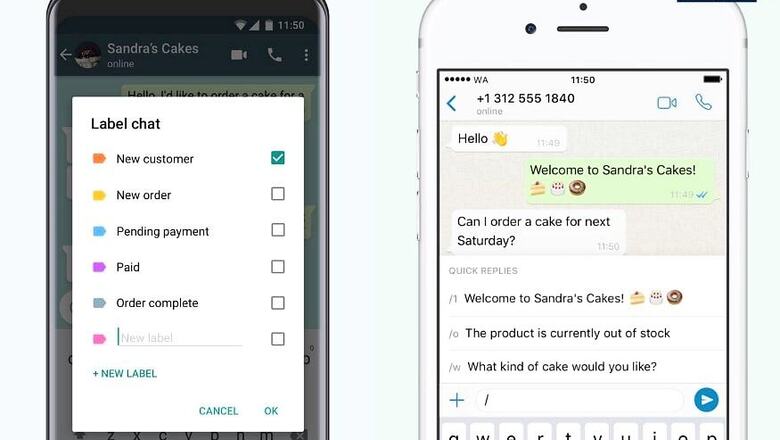
views
You have a toddler at home. You perhaps regularly but a particular brand of diapers from a particular online or offline store. If that store becomes unavailable to you for some reason, you will most likely shift to buying from another store or outlet. The toddler’s requirements remain consistent, irrespective of the world order at the time. What does a store or business owner need to do—ensure that they are available to you, in one way or the other. Indian startup Superbottoms is just one of the many businesses across the country which are relying on tech platforms more than ever to give them all the tools they need during these tough times. Diapers are just one example—the definition of “essentials” is much wider than you may have ever imagined or even though about, till the scenario of a lockdown became a very real thing. It has not been easy for businesses either way.
The lockdown in India because of the COVID pandemic, has particularly hit smaller businesses and startups hard. Technology and digital platforms have provided some respite. And a prime example of that certainly is WhatsApp, the WhatsApp Business Platform.
A million strong, and counting
For you, WhatsApp may be all about chatting with friends and family and hyperactive work groups, but businesses are relying on the Facebook-owned platform more than ever. Launched back in January 2018, it took a year before the Android-only app at the time was also made available for the Apple iPhones as well. Now, WhatsApp Business has more than 1 million businesses active on the app, in India. And it is 5 million globally. Those are massive numbers, whichever way you look at them, for a platform launched with a focus on small businesses. “The current lockdown reinforces more than ever how important local businesses are in connecting communities and providing a backbone to our economy. It’s very important to us at WhatsApp that we give businesses tools to help them achieve success and grow. That’s especially important right now when digital tools can serve as a lifeline for businesses and customers to stay connected,” says Abhijit Bose, Head of WhatsApp India, while speaking with News18.
Reaching out for customers
“We were doing an average of 300 orders per month, but during the lockdown period, our business has increased sales 10 times the usual average,” Sonusingh Kartarsingh Choudhary, Founder of Wheatmart India, tells News18. They sell a range of food grains and millets that are ground in stone-based mills, and home-delivered directly from their store to homes in Pune. The reason is, they have stayed connected with their existing customers through the lockdown phase to ensure they deliver whatever each household requires. Choudhary points out that this has also helped spread a good word about them, which has seen the customer base widen. “WhatsApp has played a very important role in helping us reach out to our customers and, in turn, their friends and family,” he says.
Building the bond with your customers
This has been a particularly challenging time for Superbottoms founder Pallavi Utagi. Not only do they have a new concept that requires some amount of communication as part of the education process, but also sees customers come back with queries. “Our concept is new to the Indian market and requires a concerted push to educate parents on cloth diapers, both pre and post-purchase. Since most of our customers are to-be or new parents, they’re occupied all the time and prefer reaching out on a medium that is most convenient and immediate. That’s why WhatsApp has been our go-to channel to connect since day 1,” Utagi tells News18. The stats make for a rather interesting reading. Superbottoms is now handling as many as 500 queries a day on WhatsApp Business alone, despite what the company admits is a dip because of the COVID lockdown, and yet also do close to 100 video demos through WhatsApp video calls to help parents with any challenge they may face with Superbottoms.
Then there is the very aspect of building a bond as you communicate, something that most product literature and business schools’ educational literature don’t necessarily talk about. “What is great is that due to the conversational nature of WhatsApp, our team of mothers who handle the queries eventually develop a personal connection with these new parents and often the discussions go beyond diapers to other areas of baby care too,” she says.
Giving a voice to everyone possible
WhatsApp is proud of the fact that the WhatsApp Business platform has been able to cater to the requirements of businesses across the spectrum. It is never easy to tailor a solution or a platform that works for just about everyone. “Businesses across the board, from retail to services, are leveraging WhatsApp to keep in touch with their customers and deliver essential services and goods. WhatsApp usage has hit our highest levels with kirana stores taking orders from local families, students keeping up their studies with teachers, volunteer organizations mobilizing communities, suppliers selling perishable inventory and much more,” says WhatsApp’s Bose.
Businesses like Akshayakalpa, Kriger Campus and Happy Milk have witnessed an increase of 25%, 55% and 43% respectively in their business interactions during the lockdown period, says the company.
Akshayakalpa, an organic milk company, only uses WhatsApp Business as a communication platform, and the sound reasoning behind that is pretty much everyone uses WhatsApp these days. Not only does it save on costs for businesses, but also allows them to focus on communication on one platform. “During the lockdown period, we saw a 25% increase in our interactions with consumers over WhatsApp,” says Zakir Sunasara, Lead of Digital Marketing at Akshayakalpa. There is definitely the convenience for users who don’t have to shift to another app to get in touch with the brand. But, Sunsara does point out a rather interesting observation, “there's an element of authenticity that comes through with WhatsApp and it's easier to assure our customers that we're listening and acting on feedback.”
It is a state of tools aplenty
WhatsApp, on its part, had provided multiple tools for businesses in India. There is the Business Profile, which helps businesses create an identity for themselves—details about what they do, how to contact them and so on. Then there are Greeting Messages, quick replies and more to help businesses immediately reply to consumers, which helps to build consumer confidence as well. Last but not least are labels for businesses to keep chats and contacts organized. “Previously businesses had to send product photos one at a time and repeatedly provide information. Now customers can see their full catalog right within WhatsApp, just like walking through a store,” says WhatsApp’s Bose.
Not having to download another app to connect with a brand you regularly rely on for purchases, has its own advantages. Consumers don’t need to do anything, except reach out to these brands using WhatsApp on their phone. And they’ll get a response there itself.
Bengaluru based Happy Milk has continued to produce and deliver at full capacity, even during the lockdown. That is full 7000 liters of milk, every day, as they did pre-lockdown. “Every client is super comfortable with communicating their concerns and feedback on WhatsApp. The team uses WhatsApp Business app to share pictures, videos and live locations with customers,” says Mehal Kejriwal, Founder of Happy Milk. They use WhatsApp to share all the information that potential new customers would want, including e-kits that have pricing details. “Post purchase interactions happen over WhatsApp as well, as we like to tap our customers for feedback on the product’s taste, quality, delivery and more,” says Kejriwal.
JioMart on WhatsApp Pushes for digital inclusion
Supplies of essentials, including the range of products that you can buy from nearby Kirana stores and departmental stores, is the next big focus for WhatsApp, with the JioMart integration. As of July, last year, there were more than 400 million active WhatsApp users in India. And counting. The vision for this project which sees Facebook's investment in Reliance Jio, is to bring the nearby stores to consumers on WhatsApp, where they can browse the listings of what is in stock and what is available and place the orders on the platform itself. The nearby Kirana shops will get access to a platform they probably would have never had access to before, with a massive demographic of users potentially tapped in one fine swoop. And there are millions of these small merchants and Kirana stores across India.
It is not just essentials, but virtual classrooms too
Online education, virtual classrooms and digital learning have become more popular over the past few weeks, as students and teachers around the country are using digital platforms to continue the melding of teaching and learning processes. That has given the education network and marketplace Kriger Campus a big boost as well. The proposition that they offer itself is unique—they connect educators and students in what is a one-of-its-kind marketplace with on-demand services available for access. For instance, a teacher can list books, counselling services, study material, test paper guidance and training sessions and students can sign up as per requirement. “Pre-lockdown we attended to about 500 business enquiries every week. During the lockdown, the number has soared to 1000+ enquiries per week,” Suraj Satyarthi, Founder of Kriger campus, tells News18. WhatsApp Business has been an integral part of their business from the outset, and that focus is now paying dividends—a 55 percent increase in interactions on the platform during the lockdown. There are increased interactions across the board, which means students, parents, teachers and institutes are all using the platform more than ever.
In a way, the COVID pandemic and the resultant lockdowns have ensured that the digital platforms have received an even bigger push, as consumer habits change. Online purchases, customer interactions using WhatsApp and digital payments are all part of the larger scheme which talks about digital-first.




















Comments
0 comment